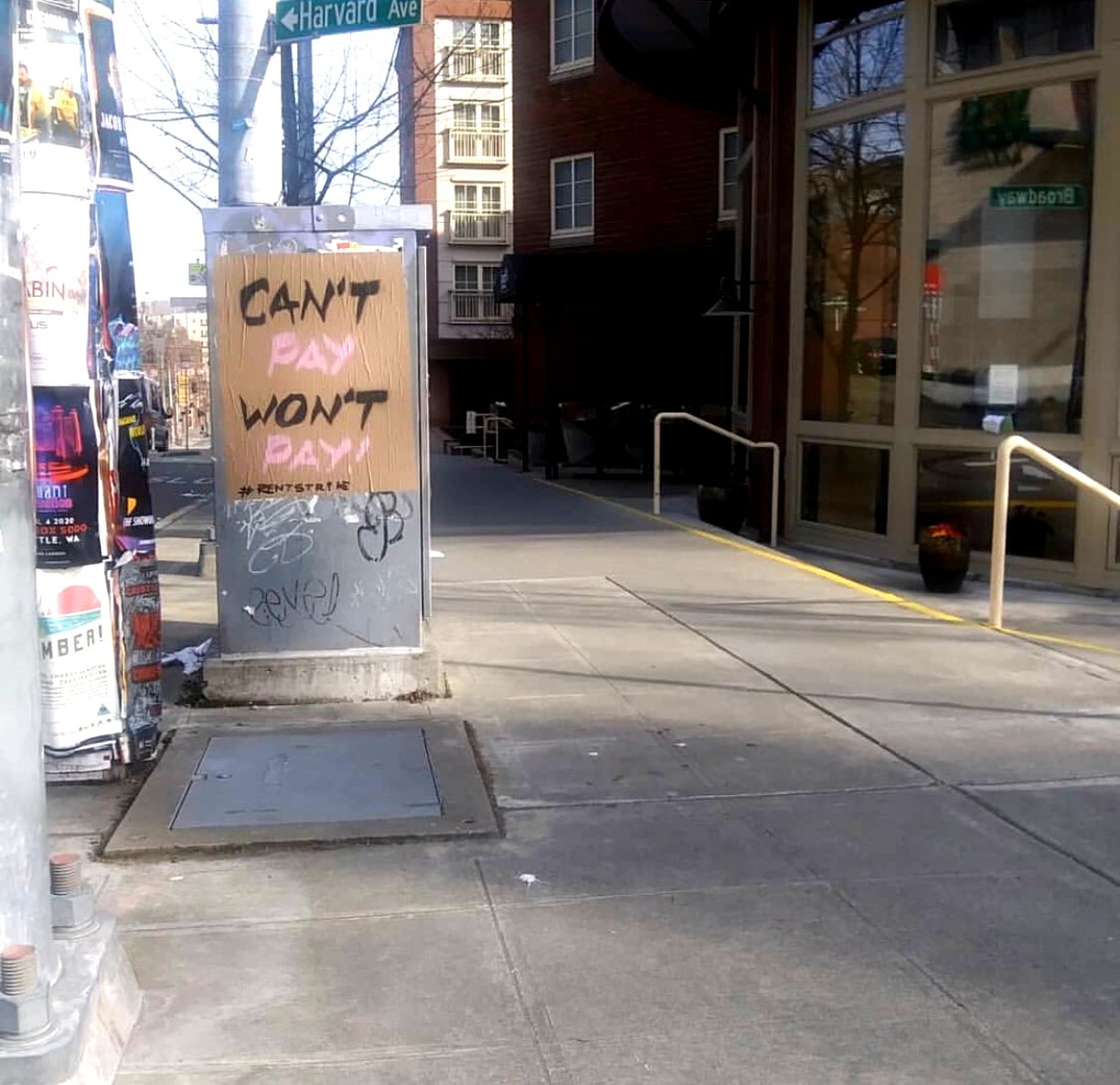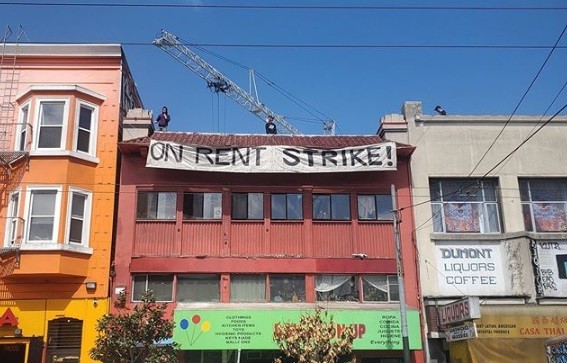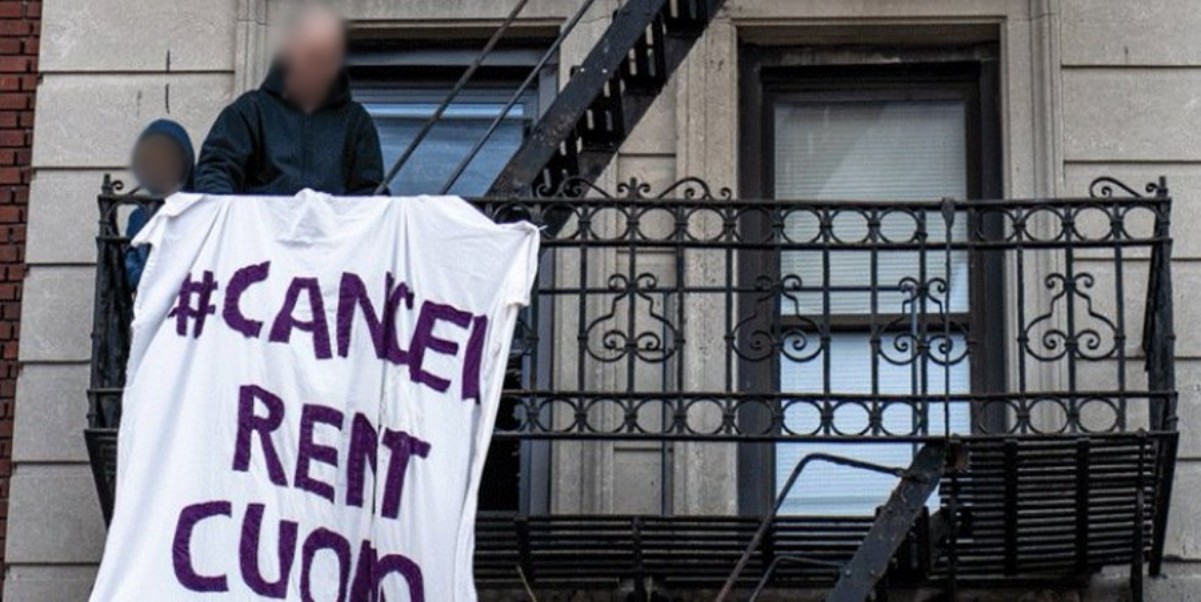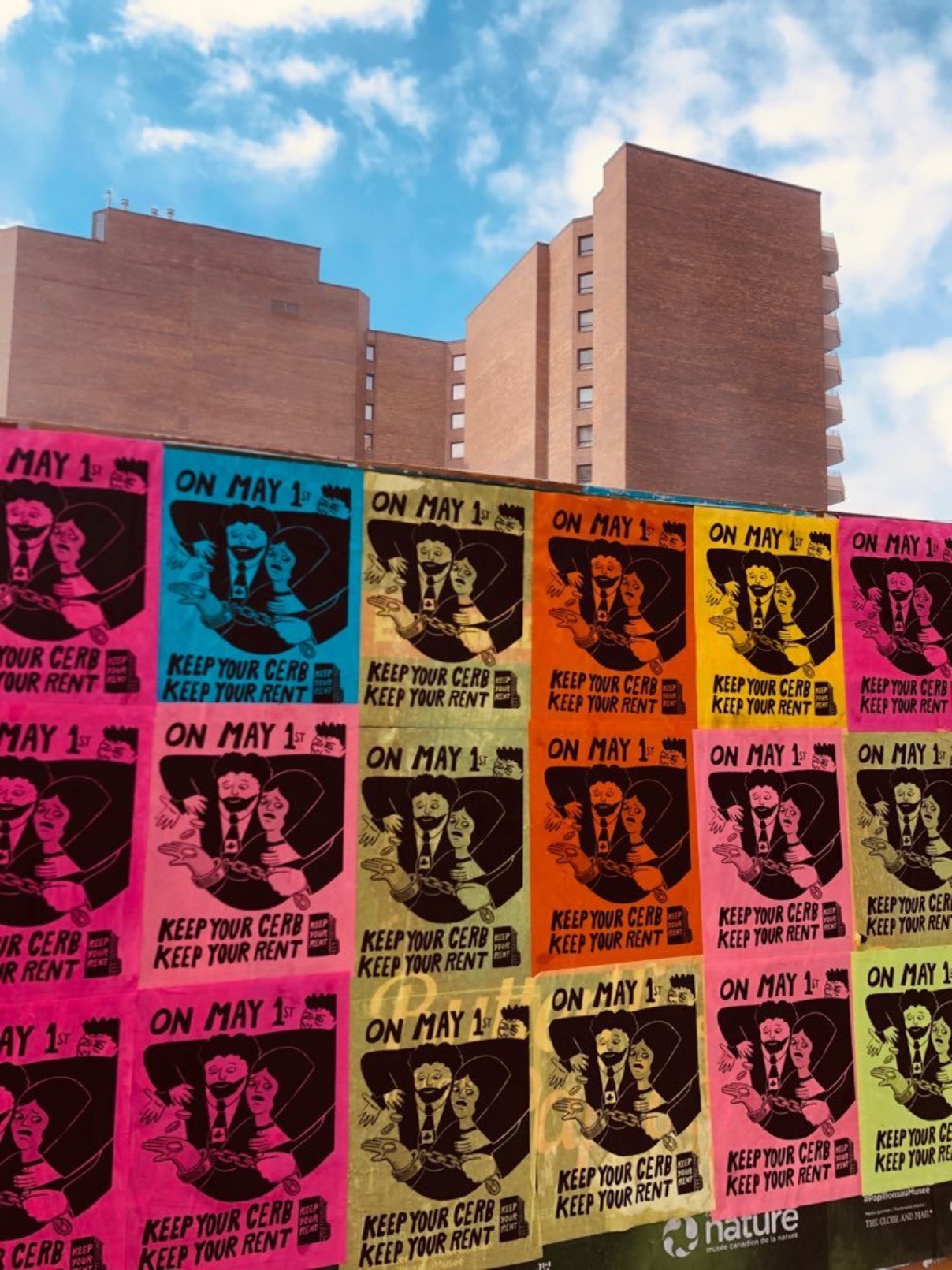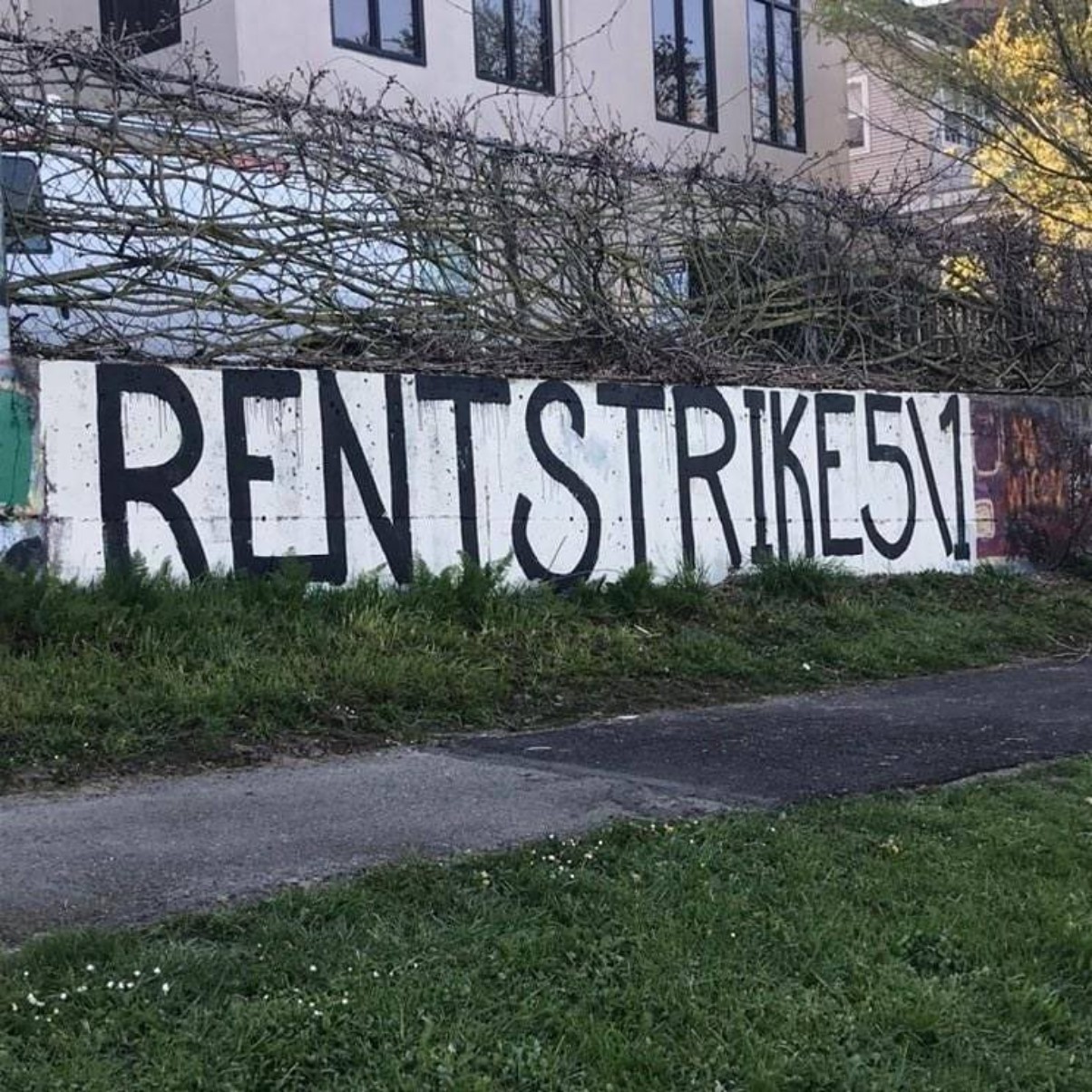Filed under: Analysis, Canada, Community Organizing, Disaster, Featured, Housing, US
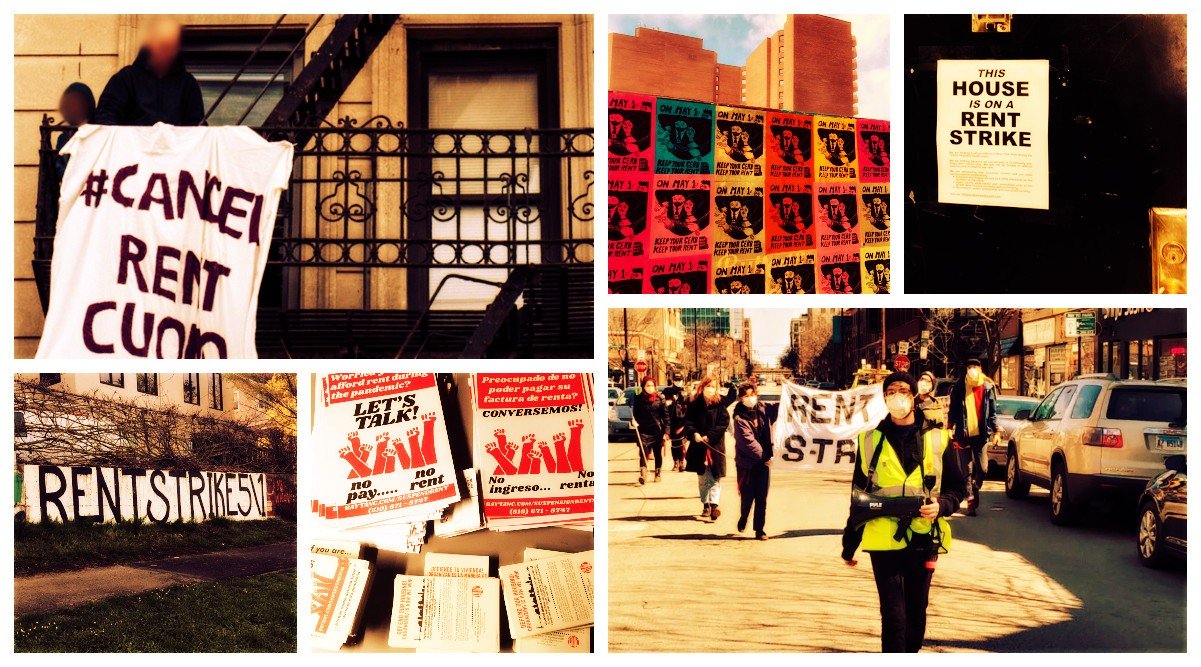
On April 1st, people across the world refused to pay their rent, as the coronvirus outbreak created a ripple effect throughout the global economy, forcing millions out of work and millions more onto the front-lines of the pandemic as “essential workers.” Alongside an explosion of wildcat strikes and actions by prisoners and migrant detainees, the past few weeks have seen a viral push for a rent strike grow into a physical reality, as recent reports estimate that upwards of around 30% of renters in April reportedly did not pay their landlords in the US and Canada.
Over a hundred tenant organizers are on the National ATUN call organized by @LATenantsUnion. Powerful work is being done all across the country. The struggle is going to be long and hard, but continues ?
— Tenants United Hyde Park/Woodlawn (@TenantsUnitedHP) April 18, 2020
While some renters have been successful in either working with or pushing back against their landlords, as a class, landlords have also retaliated, both in the media, and directly against renters. But with unemployment rising in the US to over 26 million; that’s about 1 in 6 American workers, calls for an expanded rent strike on May 1st, also known as May Day, are growing both in the US and in Canada.
Missouri… are you ready for this? Highway takeover in an hour. We will have tenants spanning the state, every five miles, from Kansas City to St. Louis. #ProtectMOTenants #CancelRent pic.twitter.com/c27S57sPM5
— KC Tenants (@KCTenants) April 20, 2020
Wanting to know more about how the rent strikes that were launched on April 1st were faring, if their efforts had grown over the last few weeks, and what hopes organizers and tenants have for the prospects of an even larger wave of strikes on May 1st, we sat down with a dozen rent strikers and tenant organizers to learn more. What we found is that in cities where tenants have been organizing themselves for some time, or where new formations have have been working alongside established support groups as well as mutual aid projects and networks, these efforts have not only continued forward, but have also greatly expanded.
The South Central Tenants Local just voted to all go on rent strike for May ✊?
— Addie (@fullcalmmunism) April 24, 2020
We also discovered that tenants in many cities are utilizing a wide diversity of tactics. The LA Tenants Union for instance in Los Angeles, CA, no stranger to supporting rent strikes, is currently engaged in both a pressure campaign against the Mayor to have rent freezed, while also backing existing rent strikes and calling for more on May Day. In Kansas City, tenants organized a highway takeover to demand a rent freeze. In Jersey City, NJ, tenants in a building owned by the Kusher family originally pressured their landlords for a reduction in rent, but are now contemplating going on a full rent strike if landlords continue to not meet their demands. Some groups of renters have been able to work directly with their landlords, while others have faced steep resistance.
GOOOD MORNING @MitchOFarrell. Talking all that shit, Mitch. Going to have to hear from the people #PeoplesCityCouncil #RentZero #NoVacancyCA pic.twitter.com/tjnmOEWlCX
— maybe: #RentZero (@ricci_sergienko) April 23, 2020
With unemployment rising to the highest its been since the great depression and more and more tenants linking up with growing organizing initiatives – things seem poised to not only continue forward, but deepen in their degree of organization, coordination, and sheer numbers. While key questions remain, the movement seems poised to explode as May 1st quickly approaches.
Getting Organized in the Pacific Northwest
While its impossible to know how many people participated in the rent strike that began on April 1st, it seems that at least 1/3 of US renters did not pay; or at least, do not pay their full rent in April. Attempts by tenant and rent strike organizers to map public rent strikes show dozens of active hubs of refusal, and as our report in early April showed, many cities reported dozens, if not hundreds of tenants taking part.
As one Bryce Covert wrote:
At the end of March, tenants across the country banded together with their neighbors and refused to pay rent for the month of April in the face of a viral pandemic that forced at least 22 million people to file for unemployment. Hundreds of people are on strike in the Bay Area alone; according to the National Multifamily Housing Council, 31% of renters across the country didn’t pay on April 1. Nearly 10 million people were already struggling to afford rent before the crisis, and the National Low Income Housing Coalition estimates at least 1.5 million will now be in the same boat.
Rent Strike Posters in Seattle
Since April 1st, other rent strikes have also been announced. In Seattle, the music venue and housing cooperative Murder Mine released the following statement this week saying they were joining the strike:
We have decided collectively to go on rent strike. Some of us are out of work, as artists and service industry workers, and resorting to our limited amount of savings to support ourselves and our families. On top of that, we feel the importance of standing in solidarity with all people facing the heavy economic burden of this pandemic shutdown. Whether or not you have the means to pay rent this month, if we stand together we can push for the changes we need. The eviction moratorium in Seattle gives us a protective buffer, but it is not enough. We demand a rent suspension. We demand no debts. People who have the privilege to pay, think for a moment if you didn’t have that safety net. You would want your friends, neighbors, and community to be supportive of each other. This is how we do it: Rent strike now! No mortgage payments!
Other tenants in the Seattle area are also getting organized. In a statement to It’s Going Down, the Puget Sound Tenants Union wrote:
We wish landlords would do the humane thing and forgive the rent of tenants who aren’t making any money due to the crisis, but they aren’t. More and more tenants who can pay are standing in solidarity with those who can’t. It’s up to the landlords really: they can do the right thing for their out-of-work tenants, or they can face rent strike action from their tenants, but they aren’t. As an example, currently Cornell & Associates has outright refused to forgive rent in several buildings. In response, those buildings are quickly getting organized. Additionally, we have tenants in a number of other buildings organizing to withhold rent in response to the pandemic.
Other Pacific Northwest based rent strike and tenant groups in Portland, Olympia, and Corvallis are also continuing forward with rent strike campaigns and in support of tenants who have already begun refusal of payment on April 1st.
Bay Area Sees Growth of Activity
Like many larger cities, the bay area has seen of mix of both public rent strikes, such as at the anarchist housing cooperative Station 40 in the San Francisco Mission District, along with smaller strikes, and a growing amount of renters who simply can no longer pay.
Rent Strike banner at Station 40, an anarchist space in San Francisco’s Mission District
In Oakland, one of these strikers, “Timmy,” a tenant in a house of about 7, talked with It’s Going Down about their active rent strike and the growing community of refusal in the bay area that is building in the wake of the coronavirus pandemic. Originally, the tenants of Timmy’s house approached their landlord collectively before April 1st to announce their intention of refusing payment, only to have the landlord agree to refuse to pay the mortgage as well, effectively joining them on strike! During our interview, Timmy further discussed how they live in close proximity to other homes also on rent strike along with a growing network of mutual aid projects. “The reaction [to the crisis] has been really breathtaking and really positive. The way people have been able to mobilize effectively,” Timmy said, “it’s like, we got this.”
Today in agitprop: printed 700 flyers, 400 posters, and 50 post cards today at the shop. No doubt we’ll go thru them quickly too! ? pic.twitter.com/ysmM3e1E9H
— Tenant and Neighborhood Councils (@TANCBay) April 18, 2020
One autonomous anti-capitalist organization which has grown in the wake of the pandemic is Tenant and Neighborhood Councils or TANC, which was founded several years prior to the outbreak “to build some kind of infrastructure” that “people could grab onto and use,” stated a media spokesperson for TANC in an interview with It’s Going Down. They went on to describe how the group has grown from about 25 members to now over 240, stating that the group has been contacted by upwards of 500 bay area residents over the last few months, many asking for advice on how to navigate the current crisis along with tips for how to organize their buildings and deal with landlords.
This increase in membership has allowed TANC to take on greater amounts of organizing and outreach as well as avoid centralizing the increasing workload in just a few hands. And while the members of TANC have no exact number of how many people are both refusing to pay rent or on active rent strike, they do know that through their organizing that various tenant councils have formed in various buildings – they’re currently in contact with at least 60 of these self-organized tenant organizations, or councils. One public example being the SMC Tenants Council, made up of tenants who are currently renting from the notorious gentrifying bay area mogul, Neil Sullivan.
But the organizers at TANC also know that the fight is just getting started. When asked about what to expect on May 1st and beyond in the bay area, TANC’s spokesperson replied, “Things are getting worse, they’re not getting better, and more people are going to get involved. We’ve been doing a lot of outreach and more people are getting plugged in all the time, so the number of people participating [in organizing and the rent strike] is going to go up.”
Newer Organizing Efforts Branch Out
While some cities have existing formations which tenants can connect and organize with, in other areas, tenant organizations are starting completely from scratch. In Austin, TX for instance, the newly formed Rent Strike ATX, was organized to support a group of tenants who went public with their rent strike on April 1st, while also working alongside existing organizations. In statement to It’s Going Down, Rent Strike ATX wrote:
The co-operative house that declared a rent strike in April is still on strike, and has been in negotiations with their landlord. They are currently negotiating for a long-term lease with a generous rent forbearance plan, as well as a rent freeze for the next few years on their building. However, it is too early to tell where these negotiations will go or whether the landlord will try to go back on this promise.
March on Landlord in Chicago. SCREENSHOT from Maxwell Evans PHOTO
While this is a positive development, the broader project continues forward, as Rent Strike ATX went on to explain:
Tenant Organizing in so-called Austin has been growing slowly but steadily since the beginning of April. On the city wide level, we have partnered with the Austin Community Law Center to sponsor a petition to City Council demanding rent relief–in the form of protection from eviction for those who cannot pay rent, anti-discrimination ordinances protecting tenants who cannot pay during this crisis, and rent control. We have continued to make contact with and begin supporting tenants in over a dozen complexes trying to organize their own buildings, and are working to ramp up our ability to support and push these efforts along.
In the Midwest, another newly formed tenant organization is also building in Milwaukee. In a statement to It’s Going Down, a representative from the Milwaukee Autonomous Tenants Union stated:
We’re working with multiple groups in the state. Together, we have a contact list of around 7,000 tenants in the greater Milwaukee area, and almost 40,000 state-wide. We’re pushing for a coordinated banner drop/white sheet display across the city with the express demand that all rents be frozen, canceled and forgiven for the full extent of the pandemic crisis.
Meanwhile in Chicago, existing tenant organizations such as Tenants United Hyde Park have been working with several newly organized groups of tenants across the city. Starting in April, renters organized under the banner of Mac Tenants United (MTU) launched a rent strike against Mac Properties, to demand the cancellation of rent during the pandemic. Since the start of the rent strike, negotiations have stalled, and MTU members are now pushing for a wider strike on May 1st if their demands are not met.
Are you a MAC tenant looking to get connected with your neighbors and sign onto the MAC Tenants United demand letter before May 1st? Click through this link:https://t.co/F0GRu6uFRQ pic.twitter.com/QahRmSn9oE
— Tenants United Hyde Park/Woodlawn (@TenantsUnitedHP) April 23, 2020
Another group of tenants in Chicago at a different building are also threatening to go on rent strike against TLC Management. On April 17th, the group released a demand letter stating that if rents were not frozen and evictions halted for the length of the pandemic, then tenants would launch a rent strike starting on May 1st.
here’s the list of current tenants councils pic.twitter.com/eaZ0J9sbUQ
— Richmond Rent Strike (@richmondstrike) April 21, 2020
As renters in Chicago prepare for battle, in Richmond, VA, tenant organizers with the newly formed Richmond Rent Strike have also seized the moment to build a network of neighborhood councils. In a statement to It’s Going Down, they wrote about their recent activity:
Leading into May the decentralized autonomous network of Richmond rent strikers continues to grow. At least 18 tenant councils have formed for renters of large landlords and property management companies, and they are growing in membership with the support of Richmond Tenants Union, with whom some councils have now formally associated. Many of these councils are already in negotiations with their landlords over unpaid rent from April, and are escalating with tactics to push their demands. For example, Pondok Tenant Council organized a phone zap on April 21st to pressure Pondok Management into ceasing and desisting eviction proceedings for non-payment of rent.
Some folks are still in the process of forming tenant councils, while others have shifted to organizing at the neighborhood level, such as the now growing Church Hill Tenants – a group of autonomous tenants in the Church Hill neighborhood, focused on direct action and mutual aid.
Flyering and social media, especially the @RichmondStrike Twitter and Instagram accounts, is how many of us have been sharing information and building connections between fellow tenants.
Mass Refusal in the Northeast?
While newer groups get their feet wet, in the Northeast, major cities are making calls for city-wide rent strikes. In a statement sent to It’s Going Down, the Philly Tenant’s Union announced its intention to push for a city-wide rent strike:
The Philadelphia Tenants Union has published an official call for a citywide rent strike to take place on May 1st. The guidelines for the strike are laid out in an official statement on [our] website. The guidelines include filling out a form so that the organization can connect tenants with each other who share the same landlord to draft collective demands for reduced or cancelled rents. If landlords refuse to provide relief for tenants who cannot pay, then that is when the tenants officially join the rent strike. It is imperative that the largest Real Estate Firms in Philadelphia – with the most political influence – feel the organized power of their tenants, and Philadelphia Tenants Union is working hard to build those unions.
PTU is hosting Office Hours on Zoom today and every M W F from 2-4pm. Tune in for knowledge to keep you and your neighbors safe!
Zoom Meeting:https://t.co/5jRCESBPgQ
Meeting ID: 972 7539 9701
Password: .FLLords.#cancelrent #foodnotrent #philadelphia pic.twitter.com/RTh0iXAtyL— Philly Tenants Union (@PHLTenantsUnion) April 20, 2020
In Jersey City, NJ, one tenant organizer that was connected to It’s Going Down through the 5 Demands rent strike hotline, discussed with us their process of organizing tenants at their building, which began with a petition that brought together 150 tenants out of 200. Many of the people in the building simply could not pay following the outbreak, as the tenant organizer explained to us during an interview, “A lot of people in the building have been laid off or have been furloughed.” But when tenants attempted to approach their landlords, a part of the same real-estate company owned by Jared Kusher’s family, to ask for a reduction in the rent, the landlords refused. Now, tenants are talking about launching a full on rent strike as unemployment mounts and people are taking out loans on credit cards.
Finally in New York, where over one million people have now filed for unemployment, there are growing calls for a city wide rent strike. The real question is: will this truly turn into a full on renter revolt? In a recent interview with It’s Going Down, tenants with the 1234 Pacific Street Tenant Association in Brooklyn, who launched a public rent strike on April 1st, talked with us about the escalating situation in New York.
“We do know that there will be a lot of buildings that will be on strike on May 1st that are building towards a large scale action – essentially a general rent strike…the likes of which haven’t been seen since the 1930s. Hundreds if not thousands of buildings, very public, with demands at the state level,” said one rent striker at 1234 Pacific.
Tenants in Brooklyn, NY Unfurl Rent Strike Banner on April 1st
Currently, people are coming together through a large-scale renter coalition, made up of a wide variety of tenant associations and organizations. “Increasingly people are having these conversations in their buildings with their neighbors. We know that about 1/3 of Americans didn’t pay rent in April, going into May, millions more people will not be able to pay,” another rent striker explained.
As we speak, the housing coalition, Housing Justice for All, is encouraging people to sign its rent strike pledge, which currently has over 6,000 signatures. When asked what will happen on May 1st, one rent striker at 1234 Pacific responded by saying, “The truth is that we know that millions of people won’t pay the rent on May 1st, the question is, can we say that those people are coordinated and organized and working together – making collective demands? That’s the problem that the movement is working on right now. Organizing what otherwise could unfold as chaos, into something meaningful and something directed at the levers of power.”
Keep Your Rent Campaign Gains Steam and Supporters
Up in Ontario, Canada, where a large media spotlight has been put on the organizers of Keep the Rent, an outgrowth of Parkdale Organize, which has organized a string of rent strikes and other actions in the working-class Parkdale neighborhood, there are growing calls for mass non-payment of rent on May 1st. Already, tenant organizers have built up a massive network of supporters in the lead up to April 1st and many are predicting that May 1st may be the kick off to a broader public campaign.
Thread: Things to do before May 1
1. Put up a banner on your balcony:
"Keep Your Rent May 1" pic.twitter.com/TFxzccgDhZ
— Keep Your Rent Toronto (@KeepYourRent) April 22, 2020
“What’s developed is a concerted organizing effort taking place in districts of Toronto that is adding to the numbers of [tenants engaging in] non-payment. [Keep the Rent is] developing a basis of organization in working class districts that will continue to defend against eviction and attempts by landlords to threaten and coerce people going forward,” stated a member of Keep the Rent in an interview with It’s Going Down.
They went on to add, “All our energy has been on assisting our contacts to put some sort of organizing plan [in place]. I expect some of the newly organized buildings to come to the fore and make public statements about what they’re doing. The hardship is only deepening, but the organizing we’re seeing people engage in is building.” And there’s lots of signs of that capacity growing, with organizers stating that their online platform in recent weeks “has been used to send over 100,000 letters to landlords in Toronto, stating that they would not be paying rent.”
Other regions of so-called Canada have been having more mixed results, however. In a statement to It’s Going Down, a representative from Draps Blancs spoke to activity in so-called Montreal:
Several different autonomous groups are still organizing around the rent strike and tenant power – the Draps blancs (White Sheets), who put out the original call, the Syndicat autonome des locataires de Montréal (SALM, or autonomous union of Montreal tenants), Pas de logement pas de quarantaine (No housing, no quarantine), and multiple informally organized groups of renters. The movement faces a few challenges: many of those who were unable to pay rent specifically due to the crisis have received the federal benefit, and pre-pandemic tenant organizing has largely been the terrain of more institutional community-sector groups who do not necessarily support the strike. While thousands of renters (undocumented folks and sex workers, to give just two examples) don’t qualify for the benefit and are therefore heading into their second month of non-payment, efforts on the anti-capitalist left are turning towards more limited strategies to prevent a mass wave of post-COVID evictions.
Keep Your Rent Posters
Conclusion
In many ways, we have only scratched the surface in terms of how far the new autonomous tenant movement has permeated within the current moment. As we speak, there are tenant actions, strikes, and organizing drives happening in Denver, Bloomington, and St. Louis; students at the University of Florida are pushing for a rent strike, and whole buildings outside of DC are getting organized and threatening mass refusal. One thing is becoming clear: people across a wide social terrain are coming together, talking about shared conditions, and beginning to get organized. Moreover, not only are people not waiting for change to come from above, but these actions are being organized by groups largely completely independent from political parties, labor unions, and non-profits.
Rent Strike Graffiti in Seattle, WA
But despite its growth, the movement still has many questions to answer: what happens if mass payment doesn’t generalize – are organizers committed to the long haul? What happens to all the people being made homeless, pushed out of the housing market – are tenant groups ready to take over vacant buildings as people have in southern California? What happens when the courts start back up and police begin with eviction proceedings – is the movement ready to respond with eviction defense? Also, will this new movement be stifled by attempts at recuperation by politicians or co-option by bureaucratic Left groups? The answers to these questions and how they play out in the pubic arena may decide how far things generalize.
While a few people in cities we talked to expressed hitting points of exhaustion or burnout, or that their organizing efforts had not grown – most organizers and those on rent strike expressed how they have been able to build a network of support and solidarity since April 1st and look forward to May 1st and beyond. As many reiterated, May 1st will simply be the continuation of a push by renters against a system that was exploiting them long before the coronavirus was a household word, and hopefully, these relationships born out of self-organization and class conflict will grow into the future as poor and working people continue to assert themselves.


